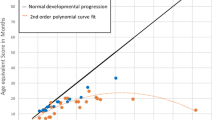Abstract.
Seven patients with hemolytic-uremic syndrome who had major neurological symptoms during the acute illness were neurologically and cognitively evaluated prospectively several years after recovery from the illness. Four patients showed evidence of subtle neurological sequelae, including posturing, clumsiness, poor fine-motor coordination, hyperactivity, and distractibility. Psychoeducational evaluation of all seven subjects revealed mean scores within the average range in cognitive abilities, academic achievement, single word receptive vocabulary, visual/motor planning, overall adaptive functioning, and hyperactivity. The lapse of time (minimum of 7 years) between the acute illness and the psychometric evaluation could have been responsible for our normal results.
Similar content being viewed by others
Author information
Authors and Affiliations
Additional information
Received August 4, 1995; received in revised form and accepted December 11, 1995
Rights and permissions
About this article
Cite this article
Qamar, I., Ohali, M., MacGregor, D. et al. Long-term neurological sequelae of hemolytic-uremic syndrome: a preliminary report. Pediatr Nephrol 10, 504–506 (1996). https://doi.org/10.1007/s004670050150
Issue Date:
DOI: https://doi.org/10.1007/s004670050150




